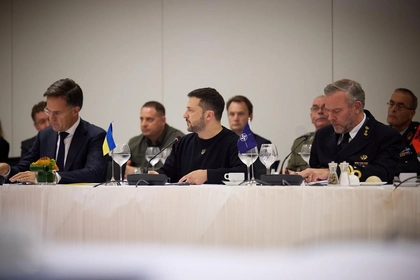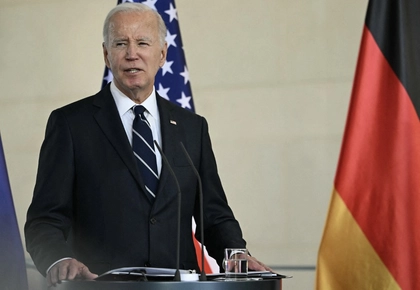It was very disappointing to learn that “Ukraine’s First Lady” had “snubbed” an invitation to the White House because (according to numerous reports) “she did not want to be seen with the widow of Alexei Navalny.” US officials had hoped that the image of both Mrs. Zelensky and Mrs. Navalny would have been a powerful backdrop to President Biden’s State of the Union address.
When Russia first invaded Ukraine in 2014 Navalny had opposed the invasion but his view was in line with the general Russian nationalist and imperialist mindset that saw Crimea as historically Russian. Hence, he claimed that Crimea was “de facto Russian” and ruled out its unconditional return. But, the “Crimea question” had been uncomfortable for him.
JOIN US ON TELEGRAM
Follow our coverage of the war on the @Kyivpost_official.
Shortly afterward, Navalny published a blog post in which he voiced his support for that year’s Maidan protests in Kyiv, but he also decried Nikita Khrushchev’s 1954 decision to “gift” Crimea to Ukraine, calling it “voluntaristic, unfair and illegal” — though he stressed he did not support the recent Russian takeover. In an interview on radio station Ekho Moskvy, Navalny stated that Ukrainians should accept that Crimea would “never in the foreseeable future” be returned to Ukraine and that the peninsula was not just “a sausage sandwich to pass back and forth.”

Zelensky, the Budapest Memorandum and the Ukrainian Atomic Bomb: 5 Things to Know
With no obvious solution in mind – but still troubled by the question, Navalny called for a new fair and free referendum on Crimea’s status, with international observers, followed by a negotiated conciliation process that could take “decades.”
In February 2023 Navalny and his team published a 15-point statement of his vision of a post-war Russia. These reflect a notable evolution of his position on Ukrainian territorial integrity by calling for the restoration of Ukraine’s 1991 border, by emphasizing that the borders of both Ukraine and Russia had been internationally recognized and defined at that time.
In addition, his statement also advocates paying reparations to Ukraine: “Let me re-emphasize that we will have to reimburse Ukraine for all the damage caused by Putin’s aggression after the war” and restore “normal economic relations with the civilized world.”
This shift in Navalny’s position regarding Crimea represents a significant departure from his earlier claim that the peninsula was “de facto” Russian. His modified stance underscored the importance of adhering to the borders established in 1991 and seeking restitution for the impact of aggression.
In nine years Navalny’s sentiments towards the “Crimea Question” shifted from outright nationalist claims that Crimea was properly “Russian” and its transference “as a gift” to Ukraine was illegal; to calling for a new referendum and negotiations on its status; to firmly asserting that Ukraine’s border should be restored to that defined in 1991; and, finally, that there was to be no further discussion on that point…in short, a remarkable and brave challenge to Putin issued by a dying prisoner from his Arctic Circle cell.
Unfortunately, by “snubbing” the invitation from President Biden, the one person on whom so much of Ukraine’s survival and well-being rests, and by denying him the opportunity to highlight the presence of two women who each shared in tragedies inflicted on them by the same butcher in Moscow, the Ukrainian government has made a serious public-relations and morally objectionable mistake.
Navalny, to most of the world, is a symbol of courage, human dignity, and hope. He is all that and more. As a patriotic Russian who loved his country it is understandable that he supported a position on Crimea consistent with the sentiments and beliefs of most of his countrymen – even if historically in error. However, unlike most Russians, he rebuked his government for the invasion and the takeover.
Furthermore, unlike most Russians, he recognized the fallacy of his original views in that supporting the continued occupation of Crimea did and would continue doing more harm to Russia than good by preventing his country from working for a better future for its people. Even if he privately still believed that Russia had a legitimate historical claim to Crimea, he is to be doubly credited for recognizing that “Russia is already large enough” and should live up to its 1991 commitments.
Far from being a concession to Russian territorial claims, Mrs. Zelensky’s acceptance of the invitation would have allowed her to let the world know that even the martyred hero – though close to death – had acknowledged that Crimea and all the other occupied territories should be returned to Ukraine for the sake of peace between Russia and Ukraine.
Furthermore, the “image” of two grieving ladies, united by their common hated enemy in the Kremlin, and each determined to work towards peace by implementing the goals set by their husbands might have had an electrifying effect on the viewers.
It is not known whether Mrs. Navalny has ever taken public positions that differ from those of her husband, though it is not likely. And even if she did, Mrs. Zelensky could have distanced herself from them by simply making it clear that she is there to honor Alexei Navalny.
Mrs. Zelensky (or rather her advisers in the President’s office) had transformed the wonderfully gracious, kind, and delightful “first lady” into a churlish and indifferent caricature.
George Woloshyn is an attorney and former Deputy General Counsel and Associate Director of the U.S. Office of Personnel Management. He was appointed by President Reagan (with Senate confirmation) to head FEMA's National Preparedness program as its Associate Director, and retired from government service in 2000 after serving eight years as Inspector General of the Federal Housing Finance Board.
The views expressed in this opinion article are the author’s and not necessarily those of Kyiv Post.
You can also highlight the text and press Ctrl + Enter






